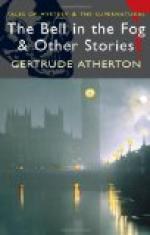I
The great author had realized one of the dreams of his ambitious youth, the possession of an ancestral hall in England. It was not so much the good American’s reverence for ancestors that inspired the longing to consort with the ghosts of an ancient line, as artistic appreciation of the mellowness, the dignity, the aristocratic aloofness of walls that have sheltered, and furniture that has embraced, generations and generations of the dead. To mere wealth, only his astute and incomparably modern brain yielded respect; his ego raised its goose-flesh at the sight of rooms furnished with a single check, conciliatory as the taste might be. The dumping of the old interiors of Europe into the glistening shells of the United States not only roused him almost to passionate protest, but offended his patriotism—which he classified among his unworked ideals. The average American was not an artist, therefore he had no excuse for even the affectation of cosmopolitanism. Heaven knew he was national enough in everything else, from his accent to his lack of repose; let his surroundings be in keeping.
Orth had left the United States soon after his first successes, and, his art being too great to be confounded with locality, he had long since ceased to be spoken of as an American author. All civilized Europe furnished stages for his puppets, and, if never picturesque nor impassioned, his originality was as overwhelming as his style. His subtleties might not always be understood—indeed, as a rule, they were not—but the musical mystery of his language and the penetrating charm of his lofty and cultivated mind induced raptures in the initiated, forever denied to those who failed to appreciate him.
His following was not a large one, but it was very distinguished. The aristocracies of the earth gave to it; and not to understand and admire Ralph Orth was deliberately to relegate one’s self to the ranks. But the elect are few, and they frequently subscribe to the circulating libraries; on the Continent, they buy the Tauchnitz edition; and had not Mr. Orth inherited a sufficiency of ancestral dollars to enable him to keep rooms in Jermyn Street, and the wardrobe of an Englishman of leisure, he might have been forced to consider the tastes of the middle-class at a desk in Hampstead. But, as it mercifully was, the fashionable and exclusive sets of London knew and sought him. He was too wary to become a fad, and too sophisticated to grate or bore; consequently, his popularity continued evenly from year to year, and long since he had come to be regarded as one of them. He was not keenly addicted to sport, but he could handle a gun, and all men respected his dignity and breeding. They cared less for his books than women did, perhaps because patience is not a characteristic of their sex. I am alluding, however, in this instance, to men-of-the-world. A group of young literary men—and one or two women—put him on a pedestal and kissed the earth before it. Naturally, they imitated him, and as this flattered him, and he had a kindly heart deep among the cere-cloths of his formalities, he sooner or later wrote “appreciations” of them all, which nobody living could understand, but which owing to the sub-title and signature answered every purpose.




